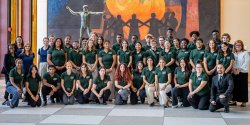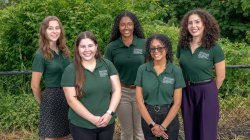
About The City of Paterson
The City of Paterson is the largest city in the county seat of Passaic County, in the U.S. state of New Jersey. Paterson has been known as the Silk City for its once-dominant role in silk production during the latter half of the 19th century.
Deliverables
The Green Team serving The City of Paterson focused on enhancing food accessibility and security in Paterson, NJ. The team conducted in-depth research on successful food programs, such as food policy councils, farmer’s markets, and urban gardens, in cities with demographics similar to Paterson. A comprehensive map was created to identify food deserts and various food sources within Paterson, including supermarkets, farmers’ markets, community gardens, bodegas, and food pantries. The map highlights areas in need of increased accessibility to healthy food. The team also performed a detailed audit of existing food policies, identifying opportunities for policy changes in ordinances, zoning, permitting, and procedures to enhance food accessibility, food justice, and resilience. Local food stakeholders and city officials were engaged through focus groups to assess their current actions, challenges, and capacity to contribute to developing a healthy food system. The team created outreach materials to promote existing farmers’ markets and community gardens in Paterson. These materials were produced in English and other languages spoken in the community to ensure broad accessibility.
Final Presentation
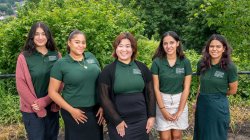
About DSM-Firmenich
DSM-Firmenich, a Swiss-Dutch company, collaborates with businesses to deliver scents and flavors to over 4 billion consumers through a variety of products. Their expertise in science, innovation, and research has been developing for over 150 years, dating back to 1869.Formed by the merger of DSM, a leader in nutrition and sustainable materials, and Firmenich, a world-renowned fragrance and flavor company, dsm-firmenich focuses on creating innovative solutions for industries like food, beverages, dietary supplements, personal care, and fragrances. The company integrates scientific expertise with a commitment to sustainability, offering products that enhance health, well-being, and sensory experiences.
Deliverables
The 2024 Green Teams project began with the development of a project charter and a stakeholder map to define the project’s scope and objectives while identifying both internal and external stakeholders. The team then compiled a master list of all laboratories, detailing information such as location, type, and specific functions, to help monitor metrics for improvements. Current green lab performance was reviewed using a checklist of best and standard practices, which was tailored for each lab and implemented at the project’s conclusion. Key Performance Indicators (KPIs) were developed and company metrics were assessed to establish a framework for measuring crucial data such as water and energy consumption, and identification of areas that required adjustments to align with dsm-firmenich’s sustainability goals. Finally, the team created a “Green Labs Tips” page to be displayed in laboratories worldwide, featuring universal tips and tricks for enhancing lab sustainability in an easy-to-use format. In addition to completion of the deliverables, the team received certification from a nonprofit organization “My Green Lab” and began the base work for a chemical exchange program.
Final Presentation
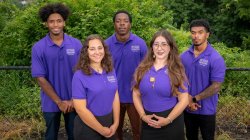
About Foodshed Alliance
The Foodshed Alliance is a nonprofit organization in New Jersey focused on supporting farmers, improving access to healthy food, and protecting the environment. Its mission is to enhance sustainable and regenerative farming practices while safeguarding community resources. The organization believes that the health of communities, land, and local farms is interconnected, as farmers are essential to maintaining this relationship. To achieve its goals, the Foodshed Alliance collaborates with farmers, consumers, agricultural professionals, academia, and community partners to build a resilient and healthy foodshed that nourishes people, respects the land, and strengthens local communities. As a registered 501(c)(3) nonprofit, it is dedicated to promoting sustainable agriculture and fresh, locally grown food in northern New Jersey.
Deliverables
The Green Team serving the Foodshed Alliance utilized mapping and field sampling to identify locations for precision agriculture. The team updated the SAgE (Sustainable Agriculture Enterprise) Farm map in ArcGIS Pro to identify areas within the farm field that were dry and those that were wetter by conducting field sampling and assessing gravimetric water content as well as percent organic matter with loss on ignition and soil texture. Additionally, the team designed a robotic variable rate application sensor to identify soil conditions in real-time data, utilizing Arduino-based tools for data collection, analysis, and precision monitoring. Upon completion of their project, the Green Team serving the Foodshed Alliance has been preparing to submit their work to the Institute of Electrical and Electronic Engineers (IEEE) for presentation and publication.
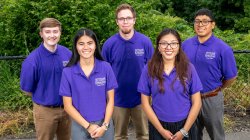
About Greens Do Good
Greens Do Good, a hydroponic vertical farm in Hackensack, NJ, is dedicated to transforming how the local community sources fresh, sustainable produce while empowering individuals with autism. Through its Workforce Development Program, Greens Do Good provides teens and adults with autism hands-on training and paid employment, teaching essential job skills and environmentally sustainable farming practices. With over 800 hours of training offered annually, participants gain valuable work experience and build their resumes. By partnering with local businesses and engaging in community outreach, Greens Do Good creates employment opportunities, raises autism awareness, and promotes eco-friendly farming methods.
Deliverables
The Green Team serving Greens Do Good worked on the organization’s vertical hydroponic farm in Hackensack, New Jersey to learn about small-scale urban farming and create a training module on virtual reality to help train workers with autism. The team researched human-computer interaction and created a use case diagram for the program. After preliminary research and training, they moved forward to create a virtual simulation. They initially decided on three different versions of simulation, two types of augmented reality programs, and one virtual reality program. The team utilized Greens Do Good’s two training models based on the capability level of the workers. These modules included the placement of the growing medium into trays, followed by the placement of seeds in the growing medium. The team successfully finished both the augmented reality and virtual reality programs. The team tested the programs on the workers with autism and the work is now undergoing modifications to optimize ease of use and create additional training modules.
Final Presentation

About Hackensack Meridian Health
Hackensack Meridian Health is a leading not-for-profit healthcare organization and the largest, most comprehensive, and truly integrated healthcare network in New Jersey. It offers a full spectrum of medical services, innovative research, and life-enhancing care. The network includes 18 hospitals and is supported by more than 36,000 team members, 7,000 physicians, and over 500 patient care locations. These locations encompass ambulatory care centers, surgery centers, home health services, long-term care and assisted living communities, ambulance services, lifesaving air medical transportation, urgent care centers, physician practice locations, and a fitness and wellness center.
About Kaiser Permanente
Kaiser Permanente is one of the nation’s largest not-for-profit health plans, serving 12.5 million members. At Kaiser Permanente, physicians are responsible for medical decisions. The Permanente Medical Groups, which provide care for Kaiser Permanente members, continuously develop and refine medical practices to help ensure that care is delivered in the most efficient and effective manner possible.
Deliverables
The Green Team serving HMH/KP aimed to identify hurdles and incentives for widespread electric vehicle (EV) adoption in the healthcare industry nationwide. The team started their project by summarizing the current infrastructure and use of EVs) in the US (versus Europe). The team then identified policy limitations and incentive opportunities for EV adoption and assessed whether the grid could handle electrifying healthcare vehicle fleets. Emissions savings through widespread EV adoption in healthcare were then estimated. The team provided market analysis for attitudes and perceptions regarding EVs within healthcare and external industries and conducted a historical analysis, identifying other industries that have introduced transformative technologies and the time frame of adoption. The Green Team serving HMH/KP estimated the return on investment (ROI) for EV infrastructure needed to support EV adoption in healthcare and proposed the next steps to incentivize and motivate market transformation in this sector.
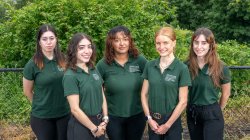
About New Jersey Resources
New Jersey Resources (NJR) is a Fortune 1000 company that provides natural gas and clean energy services, including transportation, distribution, asset management, and home services. With its demonstrated leadership as a premier energy infrastructure and environmentally forward-thinking company, NJR is committed to meeting customers’ expectations for safe, reliable service; delivering value for our shareowners; strengthening our communities, and supporting a transition to a clean energy future.
Deliverables
The Green Team serving New Jersey Resources worked on evaluating the environmental stewardship projects of the company. The team conducted an assessment of carbon sequestration reporting frameworks for coastal ecosystems and developed measures or estimates of carbon sequestration in various areas. The team then evaluated and communicated ecosystem services as benefits to residents. A potential model, including key performance indicators, evaluating stewardship project impacts was created, and the team developed criteria for non-quantitative inputs that can be used for qualitative evaluation.
Final Presentation

About Northern New Jersey Community Foundation
The Northern New Jersey Community Foundation (NNJCF), is a nonprofit, 501 (c) 3 tax-exempt organization, with the mission to improve community life through its work in education, public health, the arts, the environment, civic engagement, and philanthropy. Central to its success is fostering collaboration among local governments, school districts, businesses, non-profits, and community groups.
Deliverables
The Green Team serving NNJCF provided insights for NNJCF’s new Green Infrastructure Plan and addressed flooding issues in Hackensack, NJ. The team did some preliminary research on green infrastructure to get a clear understanding of its performance in urban areas. They then translated this research to create educational content by focusing on one of each of the types of green infrastructure per infographic, which was also translated into Spanish. To increase the accessibility of educational content, the team created maps of Hackensack’s demographics, elevation, tree canopy, and old redlining classifications to assess environmental justice issues. The team took these maps and implemented them onto a Story Map that tells the entire narrative of their project work and findings. The team also participated in a community event where they offered their infographics along with a map to mark where green infrastructure should be installed, to obtain the public’s opinion on the city’s current environmental issues. They also created a survey to gather more feedback from the community. All of their work is part of a larger project that NNJCF has initiated in collaboration with others in Hackensack and the Bergen County area. The NNJCF PSEG ISS Green Team’s work was also featured on News 12 New Jersey.
Final Presentation

About Port Authority of New York and New Jersey
The Port Authority of New York and New Jersey is a government agency responsible for managing and maintaining vital infrastructure that supports the trade and transportation network in the New York/New Jersey region. This includes overseeing five airports, the seaport, the PATH rail transit system, and six tunnels and bridges connecting New York and New Jersey. Generally, a port authority is a governmental body that manages, operates, and develops transportation and trade infrastructure within a specific area, often owning facilities at seaports and airports while also handling bridges, tunnels, and rail systems.
Deliverables
The Green Team serving the Port Authority of New York and New Jersey worked on Auxiliary Power Unit (APU) reduction strategies in aircraft. The team collected field data on APU usage at airport gates (Newark, JFK, and/or LaGuardia airports) and conducted research and outreach on the estimated usage of APUs at other airports. The team then proposed methods for estimating emissions based on APU data that should be used in future PANYNJ GHG inventories and conducted research on strategies for reducing APU high-emission energy usage. Finally, the team visited PANYNJ’s office at the World Trade Center, where they proposed policies and initiatives that could be used at PANYNJ airports to reduce APU usage.
Final Presentation

About The Township of Verona
Verona Township is a primarily residential community in Bergen County, New Jersey, known for its blend of family-friendly neighborhoods and local businesses. Incorporated as a borough in 1907, it features a range of public services, including four elementary schools, a middle school, a high school, and a public library. The township is situated between the First and Second Watchung Mountains and offers recreational amenities such as Verona Park, a 54-acre facility designed by the Olmstead Brothers, which includes twin lakes and various outdoor activities. Additionally, Verona Township has a strong commitment to community service, exemplified by its active fire department and rescue squad, which contribute to the safety and well-being of its residents.
Deliverables
The Green Team serving the Township of Verona, along with Sustainable Verona, conducted a study to evaluate the environmental, social, and economic impacts of artificial turf versus natural grass for sports fields. The project included reviewing current research, performing a cost-benefit analysis, assessing playability, health concerns, long term effects, and conducting an environmental assessment. The findings will inform a proposal for updating Centennial Field, a 13-year-old turf field nearing the end of its life, to determine whether it should remain artificial turf or be converted back to natural grass.
Final Presentation

About The Township of Washington
The Township of Washington, located in Bergen County, New Jersey, is a suburban municipality with a strong infrastructure and strategic access to major highways and business hubs. Incorporated in 1840, the township supports a range of public services, including efficient municipal operations, well-maintained parks, and a variety of local businesses. Its proximity to New York City and surrounding economic centers makes it an attractive location for professionals and businesses seeking connectivity and growth opportunities within the region.
Deliverables
The Green Team serving the Township of Washington worked on flood mitigation strategies by conducting a preliminary hydrological assessment and completing a field survey focused on flood-prone areas in Washington Township. Surveys and focus groups were also conducted with residents to learn more about local, small-scale flooding on private land, especially for those who own land along the river banks to determine challenges and learn from their experiences. The team also worked on collecting data and creating maps. They categorized flood priority zones based on hydrological assessment findings using ArcGIS Pro and created a flood susceptibility map based on the prioritization criteria including factors such as historical flood patterns and potential impact on current infrastructure. The team assessed flood risk in select and vulnerable areas, and outlined flood mitigation strategies as the first steps for the development of a flood mitigation plan, explaining the immediate impact. Measures to alleviate immediate flood risk in high-priority areas were identified. The team also developed educational materials for community members to raise awareness of flood risk safety and take steps to alleviate flooding.
